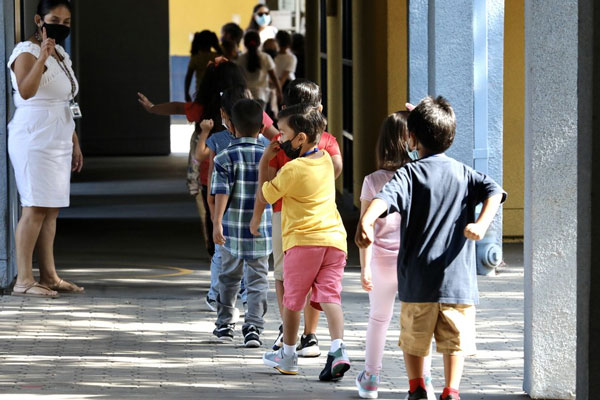
Sacramento, USA | Xinhua | From Los Angeles to New York City, public schools in big U.S. cities are reporting declining enrollment, a trend that school districts said is worsened by the COVID-19 pandemic and expected to continue in the coming years.
The Los Angeles Unified School District, the second largest in the country, lost about 100,000 students for the 2022-23 school year compared with the 2015-16 school year, a drop of more than 15 percent, according to the LA School Report this month.
In New York City, which has the country’s largest student population, public schools have lost more than 100,000 students since the pandemic hit. For this school year, more than 320 schools in the city are expected to see at least 5 percent fewer students, according to the city’s education department.
The sharp decline has forced some school districts to consider downsizing or closing schools. The Fort Worth Independent School District in Texas held a meeting on Tuesday night to discuss the possibility of “rightsizing” the schools’ capacity amid enrollment declines.
Fort Worth is one of the fastest-growing big cities in the country, but the district’s student population has dropped steadily from 87,233 in 2016 to 72,783 this school year, a loss of 14,450 students, according to the district’s document.
The district listed three factors to explain the decline: demographic trends, a lack of affordable housing for young families, and the increasing number of charter schools that have lured students away.
In Oregon, the Salem-Keizer School District told local media KATU early this month that it had 2,300 fewer students than the pre-pandemic level. The district continued to enroll around 400 fewer students per year, including in 2023-24.
The declining enrollment reflects a national issue – in nearly every state, public schools are projected to have fewer students by the end of the decade.
This fall, the total public-school enrollment in the United States is projected to be 49.7 million, and that number is expected to fall by nearly 2.5 million, or 5 percent, by 2030, according to data from the National Center for Education Statistics.
Public schools’ enrollment took a big hit nationwide during the pandemic. Nearly 1.2 million students left public schools in the 2020-2021 school year, with the biggest declines among kindergarten students, according to data from Return to Learn Tracker.
Most public schools offered only remote instruction during the pandemic, which many parents were dissatisfied with and may have had a negative impact on enrollment.
Schools offering remote-only instead of in-person instruction had a 42 percent greater decline in enrollment, according to a recent study by Thomas Dee, a professor at Stanford’s Graduate School of Education, who has studied enrollment during the pandemic.
Research showed that parents’ interest in alternatives to public schools, such as home schooling and private schools, had increased.
Big-city school districts also blamed the high living costs for the exodus of students. Los Angeles school district and New York City’s education department share similar views that the decline was partly due to a drop in students entering school during the pandemic, and a surge in families relocating to more affordable destinations.
Big-city districts are worried about major financial consequences, as state funding for school districts is typically tied to enrollment, and fewer students means less money. In the long run, they are afraid of school closures or mergers.
To boost enrollment, some school districts have come up with various strategies, such as admitting four-year-olds, launching marketing campaigns, hosting back-to-school fairs, and conducting door-to-door visits.
But Dee, in his analysis, reminded of the role of demographic changes in declining enrollment.
“The population of school-age children in the United States, those 5 to 17 years old, actually fell by over a quarter million” during the pandemic, he said, suggesting that “some of the enrollment loss during the pandemic simply reflects declining birth and immigration rates rather than an active choice not to attend public schools.” ■


